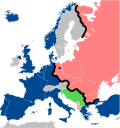Western Bloc
The Western Bloc during the Cold War means the powers allied with the United States and NATO against the People's Republic of China or Russia and the CSTO and formerly against the Soviet Union and the Warsaw Pact until 1991.
Soviet Union and the Warsaw Pact were called the Eastern Bloc. This term was rather common, while the governments and press of the Western Bloc used to speak of themselves as the Free world.
1947–1991 Western Bloc associations
NATO
- Albania (from 2009)
- Belgium*
- Bulgaria (from 2004)
- Canada*
- Croatia (from 2009)
- Czech Republic (from 1999)
- Denmark*
- Estonia (from 2004)
- Finland (from 2023)
- France*
- Germany*
- Greece*
- Hungary (from 1999)
- Iceland*
- Italy*
- Latvia (from 2004)
- Lithuania (from 2004)
- Luxembourg*
- Montenegro (from 2017)
- Netherlands*
- North Macedonia (from 2020)
- Norway*
- Poland (from 1999)
- Portugal*
- Romania (from 2004)
- Slovakia (from 2004)
- Slovenia (from 2004)
- Spain*
- Sweden (from 2024)
- Turkey*
- United Kingdom*
- United States*
* Indicates pre-1991 member state
Five Eyes
ANZUS
Anti-Soviet communist or socialist states (until 1989)
- China (from 1978)
- Democratic Kampuchea (from 1978)
- CGDK (from 1982)
- Romania[a] (from 1964)
- Yugoslavia (from 1948)
Compact of Free Association
METO, Baghdad Pact, CENTO (until 1979)
Rio Treaty
- Argentina
- Bahamas (from 1982)
- Bolivia (until 2005)
- Brazil
- Chile
- Colombia
- Costa Rica
- Cuba (1902–1959) (until 1959)
- Dominican Republic (until 1990)
- Ecuador (until 2012)
- El Salvador
- Guatemala
- Honduras
- Mexico
- Nicaragua (until 1979)
- Panama
- Paraguay
- Peru
- Trinidad and Tobago (from 1967)
- United States
- Uruguay
- Venezuela (until 1999, rejoined 2019 by Juan Guaidó)
SEATO
- Australia
- Cambodia (until 1956)
- Khmer Republic (1970–1975)
- France
- Laos (until 1975)
- New Zealand
- Pakistan
- Philippines
- Republic of Vietnam (until 1975)
- Thailand
- United Kingdom
- United States
Middle East/North Africa Region
- Afghanistan (2001–2021)
- Bahrain
- Egypt (from 1979)
- Iran (until 1979)
- Iraq (until 1990)
- Israel
- Jordan
- Kuwait
- Lebanon
- Libya (before 1969, from 2011)
- Morocco
- Oman
- Qatar
- Saudi Arabia
- Somalia (from 1977)
- Sudan (1971-1985, 2019–2021)
- Syrian opposition
- Tunisia
- Turkey (until 2009)
- United Arab Emirates
- Yemen (Hadi government)
- North Yemen (1962–1990)
Asia, Southeast Asian and Oceania Partners
- Japan
- South Korea
- Republic of China (Taiwan)
- Australia
- New Zealand
- Papua New Guinea
- Fiji
- Tonga
- Solomon Islands
- Samoa
- Kiribati
- Nauru
- Tuvalu
- India
- Pakistan
- Bhutan
- Nepal
- Bangladesh
- Sri Lanka
- Maldives
- Indonesia
- Philippines
- Thailand
- Malaysia
- Singapore
- Brunei (from 1984)
- Cambodia (from 1993)
- Vietnam (from 1995)
- East Timor (from 2002)
- Myanmar (1948-1962, 2018-2021)
- Bougainville (from 2027)
Others
- Armenia (from 2018)
- Austria
- Bosnia and Herzegovina
- Botswana
- Cape Verde
- Cyprus
- Georgia
- Ghana
- Ireland
- Kenya
- Kosovo
- Liberia
- Malawi
- Malta
- Mauritius
- Moldova
- Namibia
- São Tomé and Príncipe
- Seychelles
- Sierra Leone
- South Africa
- Ukraine (from 2014)
- Zambia
- Guinea-Bissau
- Senegal
- Gambia
- Ivory Coast
- Togo
- Benin
- Nigeria
- Cameroon
- Central African Republic
- South Sudan
- Ethiopia
- Rwanda
- Uganda
- Equatorial Guinea
- Lesotho
- Madagascar
- Seychelles
- Djibouti
- Comoros
- Eswatini
Post-1991 Western-aligned associations
Major non-NATO ally (MNNA)
- Australia (from 1987)
- Egypt (from 1987)
- Israel (from 1987)
- Japan (from 1987)
- South Korea (from 1987)
- Jordan (from 1996)
- New Zealand (from 1997)
- Argentina (from 1998)
- Bahrain (from 2002)
- Philippines (from 2003)
- Thailand (from 2003)
- Republic of China (Taiwan) (de facto) (from 2003)
- Kuwait (from 2004)
- Morocco (from 2004)
- Pakistan (from 2004)
- IR Afghanistan (2012–2021)
- Tunisia (from 2015)
- Brazil (from 2019)
- Colombia (from 2022)
- Qatar (from 2022)
Middle Eastern Partners
Asia, South East Asian and Oceania Partners
Inter-American Partners
Quadrilateral Security Dialogue
Western Bloc Media
Cold War military alliances in 1975: NATO and aligned countries (blue) and Warsaw Pact (red)



